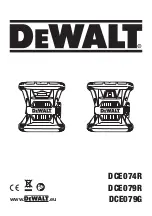
3
4
Use safety equipment.
Always wear ANSI-approved safety goggles. Safety equipment
such as dust masks, non-skid safety shoes, hard hats, or hearing protection used for
appropriate conditions will reduce the risk of personal injuries.
FCC Cautions
This equipment has been tested and found to comply with the limits for a Class B digital
device, pursuant to Part 15 of the FCC Rules. These limits are designed to provide
reasonable protection against harmful interference in a residential installation. This
equipment generates, uses and can radiate radio frequency energy and, if not installed
and used in accordance with the instructions, may cause harmful interference to radio
communications.
However, there is no guarantee that interference will not occur in a particular installation.
If this equipment does cause harmful interference to radio or television reception, which can
be determined by turning the equipment off and on, the user is encouraged to try to correct
the interference by one or more of the following measures:
Reorient or relocate the receiving antenna.
Increase the separation between the equipment and receiver.
Consult the dealer or an experienced radio/TV technician for help.
DO NOT
mix old and new batteries. Replace all batteries at the same time,
with the same make, brand, and charge level.
DO NOT
mix rechargeable and non-rechargeable batteries.
DO NOT
mix battery chemistries.
DO NOT
short battery terminal.
ALWAYS
check battery posts in the battery compartment for corrosion.
Clean the posts before use.
DO NOT
use batteries with corroded terminals.
DO NOT
incinerate or dismantle batteries.
DO NOT
dispose of batteries in fire.
DO NOT
store or use in locations where the temperature may reach or exceed
105 °F (40,5 °C), store in a cool, dry place.
ALWAYS
remove batteries if the device will not be used for an extended period.
In storage, batteries may corrode and self-discharge.
Under abusive conditions, liquid may be ejected from the battery, avoid contact.
If contact accidentally occurs, flush with water. If liquid contacts the eyes, additionally
seek medical help. Liquid ejected from the battery may cause serious injury.
Work Area Safety
AVOID
dangerous environments.
ALWAYS
make sure that any bystanders in the vicinity of use are made aware of
the dangers of staring directly into the laser beam.
AVOID
extended exposure to damp or wet locations.
DO NOT
use in the presence of explosive atmospheres (gaseous fumes, dust,
or flammable materials).
KEEP
the work area clean and well lit. Cluttered or dark areas invite accidents.
Personal Safety
Stay alert, watch what you are doing, and use common sense when operating
the device.
Secure loose clothing, jewelry, and long hair.
DO NOT
use the device while you are tired. A moment of inattention while operating
a device may result in serious personal injury or incorrect measurement results.
DO NOT
operate devices and machinery when under the influence of alcohol, medication,
or drugs.
Summary of Contents for TB-H2-LL-100-L2
Page 14: ...23 24...
































